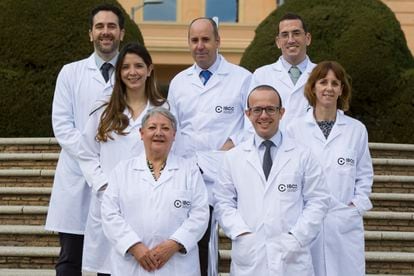In the fight against cancer, progress consists of partial victories that add up.
A drug that works in some patients against some type of tumor for a certain time.
Sometimes the progress seems small, but the sum is what can turn cancer (or hundreds of cancers), step by step, into a chronic disease, with which you can live, even if it does not disappear completely.
In some cases, those small wins are bigger than usual, and that's the case featured today in the
New England Journal of Medicine
.
The Destiny Breast-03 clinical trial has tested the safety and efficacy of the drug trastuzumab deruxtecan in patients with HER2-positive metastatic breast cancer, a particularly aggressive subtype of these tumors that affects 20% of patients.
The drug is what has been called a Trojan horse and combines a targeted drug (trastuzumab) with a chemotherapy drug (deruxtecan).
The first precisely reaches the malignant cells, where the HER2 protein, responsible for the accelerated development of the tumor, is expressed.
Once there, the chemotherapy is released in a localized way, which destroys the bad cells without damaging the healthy ones too much.
The effects of this drug, which were compared with another similar combination, of trastuzumab with emtansine, which is now the standard treatment when patients with these tumors stop responding to the first line, showed much better results.
The study, in which 524 people from 15 countries participated, showed that, 12 months after starting treatment, 75.8% of patients with the new combination achieved progression-free survival compared to 34.1 % of those who received the conventional now.
In addition, the percentage of patients alive after one year of follow-up was 94.1% with trastuzumab deruxtecan versus 85.9% with trastuzumab emtansine.
Team from the International Breast Cancer Center (IBCC) in Barcelona that has led the new studyNacho Olano
Javier Cortés, director of the International Breast Cancer Center (IBCC) in Barcelona and first author of the study, also highlights that "in 16% [of those treated with the new drug] the disease disappears", compared to 8.7% of the treatment standard.
This, moreover, "in highly treated patients", explains Cortés, and who, therefore, can develop more resistance to new drugs.
"The result indicates that we are getting closer to the long-awaited chronification of metastatic disease," he adds.
Now, a longer follow-up period will be needed to see how many patients remain disease-free in the long term.
Joan Albanell, director of the Cancer Research Program at the IMIM-Hospital del Mar in Barcelona, who did not participate in the study, states that the data from this study show that "this drug far exceeds the efficacy of the previous standard" and that, “when it becomes available, it will become the new standard of clinical practice” for this type of tumor with metastasis when initial treatment begins to fail.
Before this happens, it must pass the scrutiny process of the European Medicines Agency, which has already approved it for people who have failed two previous lines of treatment, and, in the case of Spain, the negotiations with the state for financing.
As is customary in the first phases of drug testing, trastuzumab deruxtecan is applied to the most severe cases of the disease, but according to Cortés, "it is already being studied for use in people with localized tumors, without metastasis," and it is they are seeing very promising results in tumors where HER2 expression is not so high.
Some research groups are also beginning to see the effects of this drug in lung, gastric or colorectal cancer.
In the history of small accumulated victories that is the fight against cancer, trastuzumab is an example of the ingenuity of researchers to search for new tools against a multiple disease with a terrifying capacity to adapt or to re-adapt them to continue advancing.
In the 1980s, the knowledge that some genes were behind these conditions led some scientists to think that targeted therapies could be created to block the activity of those genes.
With this idea, molecules such as trastuzumab were conceived, which blocked the expression of the HER2 gene, and has prolonged the life of millions of women with breast cancer.
Now,
the new hybrid drugs reuse the ability of those monoclonal antibodies such as trastuzumab to get inside malignant cells and unload powerful chemotherapies there.
According to Cortés, "new Trojan horses with new antibodies, new targets and new loads" are already being studied, lethal to attack different types of cancer.
New steps to ensure that cancer kills less and less or kills much later.
You can follow MATERIA on
,
and
, or sign up here to receive
our weekly newsletter
.

